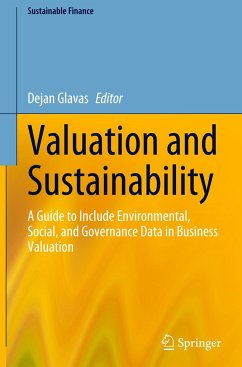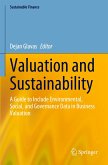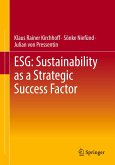Do you want to know how to integrate environmental, social, and governance (ESG) data into business valuation? This book will help you do so step-by-step.
The book primarily aims at reaching two types of audiences: practitioners and students in finance (graduate and undergraduate level). Practitioners in finance will find interest in the book, as it will give them access to academic knowledge in a format that suits them. Academic research has made substantial advances in the field of business valuation and ESG. The book intends to transform this knowledge into practical and rigorous methodologies for taking ESG into account when valuing a company. Graduate and undergraduate courses have recently developed in business schools, universities, and engineering schools. These courses usually directly refer to academic articles or valuation companies' website documentation, but not to academic books. Therefore, the book will allow students to have access to centralized and organized information about business valuation and ESG.
Readers without prior knowledge of business valuation will be guided through the ESG integration process. They will first be introduced to the concept of value and the reasons for incorporating ESG into the value. They will then learn simple financial methods to value firms and see step-by-step use cases. For instance, the reader will learn how to value a firm in the renewable energy sector using cash flow and multiple valuation methods. After building knowledge of standard business valuation, readers will better understand ESG data and ratings. The reader will then learn how to integrate ESG into business valuation using cash flow and multiples approaches. Again, the reader will be able to replicate these methods as the book will provide practical cases for integrating ESG data in business valuation. Finally, for the readers that intend to go a bit further, they will learn about the academic research advances in ESG andbusinessvaluation.
The book primarily aims at reaching two types of audiences: practitioners and students in finance (graduate and undergraduate level). Practitioners in finance will find interest in the book, as it will give them access to academic knowledge in a format that suits them. Academic research has made substantial advances in the field of business valuation and ESG. The book intends to transform this knowledge into practical and rigorous methodologies for taking ESG into account when valuing a company. Graduate and undergraduate courses have recently developed in business schools, universities, and engineering schools. These courses usually directly refer to academic articles or valuation companies' website documentation, but not to academic books. Therefore, the book will allow students to have access to centralized and organized information about business valuation and ESG.
Readers without prior knowledge of business valuation will be guided through the ESG integration process. They will first be introduced to the concept of value and the reasons for incorporating ESG into the value. They will then learn simple financial methods to value firms and see step-by-step use cases. For instance, the reader will learn how to value a firm in the renewable energy sector using cash flow and multiple valuation methods. After building knowledge of standard business valuation, readers will better understand ESG data and ratings. The reader will then learn how to integrate ESG into business valuation using cash flow and multiples approaches. Again, the reader will be able to replicate these methods as the book will provide practical cases for integrating ESG data in business valuation. Finally, for the readers that intend to go a bit further, they will learn about the academic research advances in ESG andbusinessvaluation.








